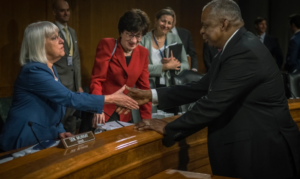
The leaders of the Senate Appropriations Committee have reached an agreement to add $13.7 billion in emergency funding for fiscal year 2024 above spending levels set by the debt ceiling agreement, to include $8 billion for defense. Sen. Patty Murray (D-Wash.), chair of the Appropriations Committee, said on Thursday the deal is aimed at addressing “serious bipartisan concerns” over the cuts to non-defense programs and defense spending caps included in the debt ceiling agreement. “Vice Chair [Susan] Collins (R-Maine) and…

 By
By 











